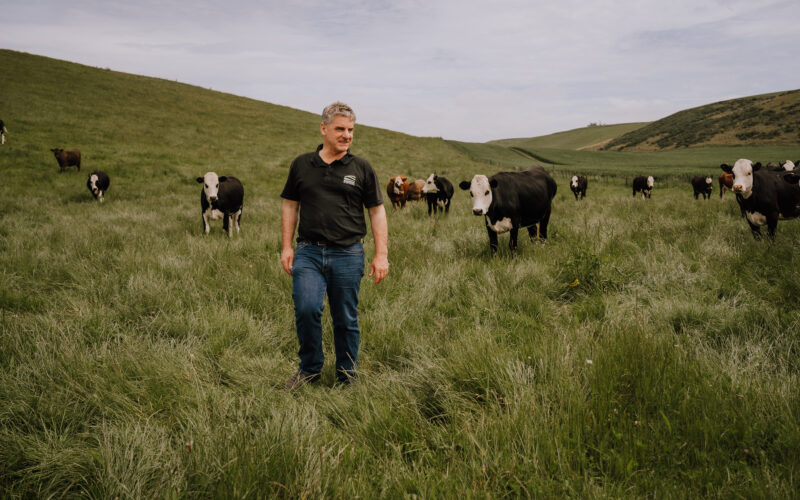
Feds’ refined policy positions on freshwater farm plans strike a balance between accountability, flexibility, and effectiveness, writes Colin Hurst.
By Colin Hurst, Federated Farmers vice president and water quality spokesperson
There were sighs of relief when the Government paused the rollout of freshwater farm plans last September, with Ministers stating the current model was too costly and not fit-for-purpose.
While Federated Farmers applauded that move, that’s not to say we don’t believe in the freshwater farm plan concept.
In fact, in an era where freshwater quality is under increasing scrutiny, and the role of farmers as stewards of the land has never been more critical, they have real potential.
So, the debate around farm plans is not about whether we need them, but how they should be implemented to ensure strong environmental sustainability without excessive bureaucracy.
Our refined policy positions on freshwater farm plans strike a balance between accountability, flexibility, and effectiveness.
At the heart of our proposal is a simple yet powerful principle: Farm Plans should be the primary tool for managing on-farm activities that impact freshwater quality. This approach shifts the focus from blunt regulatory tools like resource consents to a more tailored, action-oriented framework that considers farm-specific realities and regional needs.
One Size Doesn’t Fit All
Mandatory farm plans for all farms over 20 hectares, as suggested in the model that was being rolled out in Waikato, Southland, the West Coast and Otago before the Government’s ‘pause’, cast an unnecessarily wide net.
We want to see that walked back, with more pragmatic thresholds.
Farms over 50 hectares, those with higher stock numbers, or those undertaking activities requiring compliance with National Standards should be the focus.
Smaller and low-impact properties shouldn’t face the same regulatory burden as large-scale intensive operations. Larger and more intensive farms would have more detailed plans, while smaller farms with minimal environmental risks would have simpler requirements.
Under the Federated Farmers proposal, farm plans will encompass three key action categories: National Standard actions, good farm practice actions, and Catchment Action Plan actions. This tri-tiered approach ensures farms are held to consistent national benchmarks while still allowing room for locally adapted solutions.
Good farm standards – industry-developed and farmer-led – remains the backbone of effective environmental stewardship. Where gaps exist, Federated Farmers suggests that primary industries step in to create clear standards.
Replacing Bureaucracy with Accountability
One of the most contentious issues around FWPs is the question of certification and auditing.
Federated Farmers advocates for a high-trust model where farmers are trusted to self-record and report their actions at appropriate intervals. It works for tax returns in New Zealand, so why not for farm plans?
Farmers would still need to document their compliance within their farm plans, but the system would be clear, consistent, and fair.
Spot checks and audits by councils should be allowed, but at council’s expense. This prevents farmers from being unfairly burdened by costly oversight.
This approach acknowledges that farmers are already under immense pressure. Adding layers of bureaucracy won’t deliver better water quality – targeted, well-implemented actions will.
Local Solutions for Local Problems
Water quality challenges vary greatly between regions, which is why Catchment Action Plans are a crucial piece of the puzzle.
These plans would allow farmers, businesses, community groups and other land users in a catchment or sub-catchment to address specific risks in their local environment rather than applying broad regional policies that may not be relevant to their situation.
And here’s an important bit for all of you who resent the paperwork, box-ticking and duplication involved in reporting to multiple processors and government/council agencies – we want to see equivalency.
If you have farm plans with Fonterra or NZ Farm Assurance or with other recognised industry groups, or you’re adhering to Crown Lease agreements, that deserves recognition. If the Good Practice and National Standards criteria are covered, such existing plans should qualify under the new system.
Ultimately, the Federated Farmers’ policy positions on farm plans are built on trust, accountability, and pragmatism.
Farmers should have the option to develop their own plans or seek support from industry groups and independent advisors. Flexibility and choice will drive better outcomes than rigid, one-size-fits-all mandates.
Farm Plans aren’t just about ticking regulatory boxes; they’re about fostering a culture of continuous improvement and environmental responsibility.
Federated Farmers’ approach acknowledges that real change happens on the ground, not in boardrooms or bureaucratic offices. For freshwater quality and the future of farming, it’s time to back Farm Plans that work – for farmers, for communities, and for our environment.
You can now read the most important #news on #eDairyNews #Whatsapp channels!!!
🇺🇸 eDairy News INGLÊS: https://whatsapp.com/channel/0029VaKsjzGDTkJyIN6hcP1K























